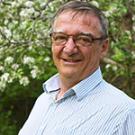Mike Jones

Presentation
Mike Jones trained as a wildlife ecologist in Zimbabwe and was employed by Zimbabwe's Department of National Parks and Wildlife Management. Much of his work over a period of 25 years was focused on large mammal population monitoring, sport hunting management, rangeland ecology, protected area management planning, community-based natural resource management, and environmental assessment.
Mike began a second career in conservation in 1995, leading community-based natural resource management programs for various small US-based non-profit organizations, working with farmers, foresters, and fishermen in a number of countries within southern and eastern Africa. This work also entailed engagement with farmers and ranchers in the United States in various projects that enabled peer-to-peer learning among natural resource practitioners on two continents. The purpose of this work was to improve the ability of local communities to share authority to manage natural resources with central government authorities. The work was founded on experience with Zimbabwe '
In 2009 Mike moved to Sweden where, as a practitioner associate of the Resilience Alliance, he occupied an unpaid position at the Stockholm Resilience Center, developing networks of practitioners willing to experiment with the application of social-ecological system science to natural resource stewardship. With its holistic view of nature in the context of complex adaptive systems, models based on social-ecological system theory provide a new and integrative way of understanding and managing change in living systems than previous approaches based on linear models. Mike Jones led the Resilience Thematic Group in IUCN's Commission on Ecosystem Management from 2012 to 2021, and was until 2016 a visiting scholar at the Wallow Mountain Institute in Oregon US,
Mike's work at CBM includes teaching natural resource management, complex systems, and social-ecological systems thinking in a number of different courses at SLU and UU; linking CBM scientists to opportunities for international collaborative research; developing an interdisciplinary network of scientists interested in applying social-ecological system thinking to landscape-scale research projects; and enhancing teaching methods for sustainable development. Mike's research work is focused on the synthesis of scientific papers for policy audiences.
Undervisning
2015 - 2021. Society and Environment Course of the Masters in Sustainable Development Program Course 2015 - 2021. Co-leader and lecturer providing a series of lectures, seminars and practical sessions on the application of Complex Systems tools for solving sustainable development problems
2018 - 2021 Introduction to Sustainable Development Course in the Masters in Sustainable Program at Uppsala University. Lectures:
- History of Development and its Environmental Impacts.
- Wicked Problems: Social Complexity in Sustainable Development
2018 - 2021. Our Natural Resources Course in the Masters in Sustainable Program at Uppsala University. Lectures:
- Forest Ecosystems and Resources
- Soils and Sustainable Development
2019 - 2021 Master’s Thesis Supervision: Six titles
2019 - 2021 Animal Welfare and the UNSDGs PhD Summer School. Course co-leader and lecturer.
2020 - 2021 Naturresursförvaltning Undergraduate Course at SoL. Lectures on Natural Resource Management and Climate Change
2021 Rural Development in the Global South PhD Course 2021. Lecture: Wildlife and rural development in Zimbabwe: a systems-based reflection on 60 years of change.
Forskning
My research involves transdisciplinary engagement with international communities of scientists and practitioners. Current work includes:
- Defining best practice principles for resilience assessment with members of International Association of Impact Assessment
- Scientific support to the International Union for the Conservation of Nature for the development and application of Nature-based Solutions with members of IUCNs Commission on Ecosystem Management
- A two-year project “Beyond sustainability: radical transformation through systems thinking” with Brock University, Toronto, Canada, and IUCNs Commission on Ecosystem Management
Publikationer i urval
2021. Application of the Adaptive Cycle and Panarchy in La Marjaleria Social-Ecological System: Reflections for Operability DOI: 10.3390/land10090980
2021. Animal Welfare and the United Nations’ Sustainable Development Goals—Broadening Students’ Perspectives DOI: 10.3390/su13063328
2020. Transformative conservation in social-ecological systems: A discussion paper for the 2021 World Conservation Congress
2019. Managing Diversity: The Challenges of Inter-University Cooperation in Sustainability Education. DOI: 10.3390/su1120561
2019. Core principles for successfully implementing and upscaling Nature-based Solutions DOI: 10.1016/j.envsci.2019.04.014
2018. Sustainability and the social dimensions of planning. Ch2 in Iwinska, Jones and Kraszewska (eds). Widening Interdisciplinary Sustainability Education. Collegium Civitas, Warsaw. e-ISBN 978-83-61067-79-5
2018. Can Resilience Thinking Be Integrated into the Strategic Environmental Assessment Process? DOI: 10.1002/ieam.4076
2017. Complex problems and unchallenged solutions: Bringing ecosystem governance to the forefront of the UN sustainable development goals DOI 10.1007/s13280-017-0918-6
2016. Strategic Environmental Assessment for Wetlands: Resilience Thinking C.M. Finlayson et al. (eds.), The Wetland Book, DOI 10.1007/978-94-007-6172-8_283-1
2015. The use of biodiversity for responding to globalised change. Ch 2 In People in Nature. http://dx.doi.org/10.2305/IUCN.CH.2016.05.en
2011. Resilience Thinking Improves SEA: a discussion paper DOI: 10.3152/146155111X12959673795886
2009. Trying to make sense of it all: dealing with the complexities of community-based natural resource management. Ch 12 In: B.B. Mukamuri, J.M. Manjengwa & S. Anstey (eds) Beyond Proprietorship: Murphree Laws on Community-Based Natural Resource Management in Southern Africa.